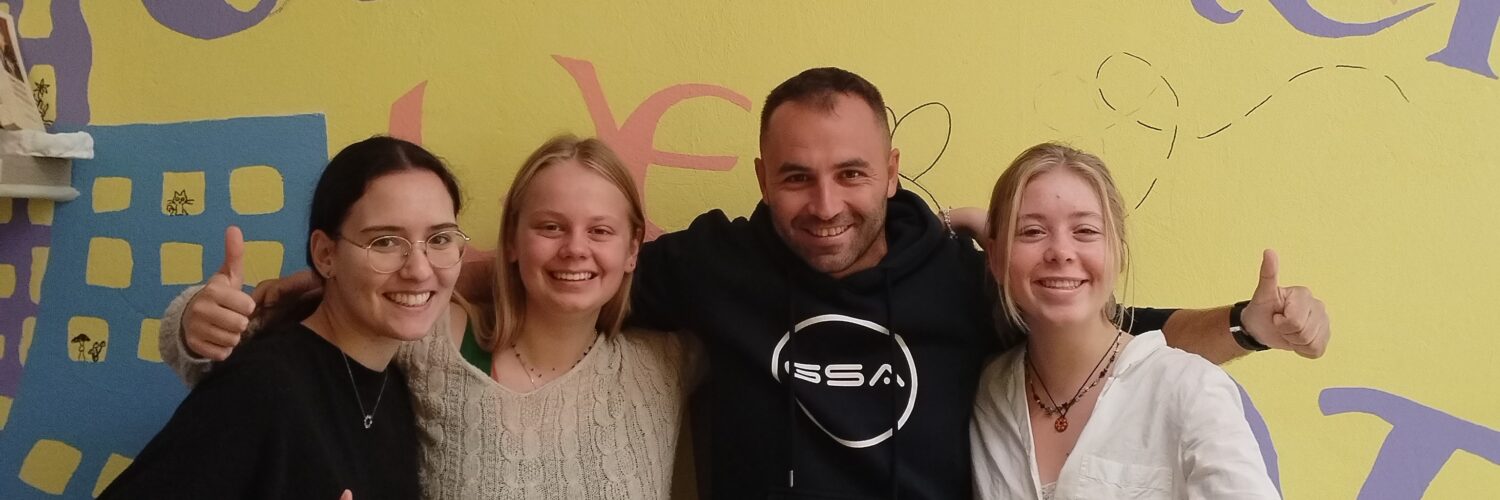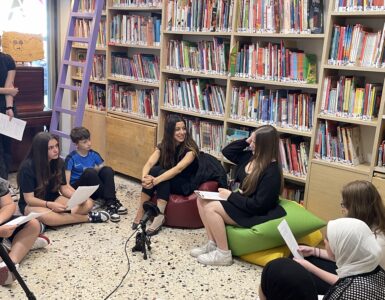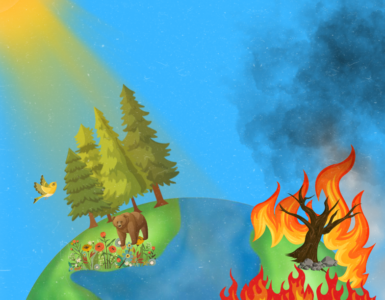As two volunteers at the Network for Children’s Rights, we developed a deeper understanding of volunteering, and over time, questions arose. Since this year marks the 20 –year anniversary of the Network for Children’s Rights, we decided to talk to other volunteers about the importance of volunteering at NCR. We wondered if our volunteer experience was similar to others and decided to talk to other volunteers to hear their stories, including the challenges they faced and the rewards they gained. We connected with five different volunteers who worked for NCR. Stefanos, who founded a football team for children, Marià, who taught Greek in the difficult times of the refugee crisis, as well as, Antonis, who initiated songwriting workshops with children, and Sofia and Stelios, who teach math currently.
The first question we asked was how it all started for them. For us, it was obvious that we wanted to leave our home country to work in another country, so we decided to start a year of volunteer work. However, during our interviewing process, we quickly realized how different motivations and origin stories of volunteering work can be. Three of the volunteers we talked to were requested to help the Network. First, Stefanos founded the football club, when many children were interested in playing football while their families could not afford a football club. Maria had already volunteered for another project before she read an invocation in a newspaper in the summer of 2015 asking for help from volunteers during the refugee crisis. Antonis had always been involved in communal participation since he became a Boy Scout at the age of 7, and later in his life, he was asked by the network to give workshops for the children in the beginning.
Stelios and Sofia provided insight into how growing up during a financial and migratory crisis challenged and changed their views and beliefs. They understood the importance of community and responsibility and wanted to make their own contribution, which led to their volunteer work.
From the outside, volunteering may seem like simply supporting a community or trying to help others. However, through our discussion with the volunteers, and also through our own experience, we realized just how much we have truly learned within our time at NCR. We wanted to know about the learning development for the other volunteers was like. For example, Stefanos learned that children often have very strong sportsmanship, and Antonis learned a lot more about the rights of children and how different every story is. Antonis told us, “The more you learn about the difficulties of children, the more you realize you know less.” Stelios explained how the learning styles of his students differ, so you need to have many different approaches. Sofia stated, “Hearing their stories and traditions has taught me the importance of intercultural understanding…”. But sadly, you don’t only learn good things, as explained by Maria, who talked about the many tragic stories the refugees told her and how difficult their lives were.
Through our experiences, we pinpointed some strengths that are important to have as a volunteer. Antonis used the words, “dedication, knowledge, training, time, and effort” to describe what truly contributes to a cause. We learned from Sofia that there are often two sides. She said, “…compassion is both my strength and my weakness”, meaning that having a strong empathy with the students was often helpful, but also sometimes hard to balance. Antonis reminded us of the importance of being patient and also how helpful it is to be a positive person. Taking all of their wisdom into account, we could feel that all of them had a strong inner urge to help, which also gave them strength to keep working.
Volunteer work can be incredibly rewarding but it always comes with many obstacles. Not all of them can be resolved, sometimes not even by the most dedicated volunteer. Furthermore, the challenges we face as volunteers can differ greatly depending on our work, as well as our own capacities. Marià told us a lot about the issues that she and her coworkers had to face during the refugee crisis. Resources were always short, and clothing, medical supplies, and food were hard to come by. Marià was often frustrated by seeing the extent of the issues she was not able to solve. “Volunteers solved many of the problems, but the state always created new”, Marià declared during our interview. Stefanos explained that it was often difficult to understand the children’s needs, while also teaching them the importance of responsibility as part of a soccer team. For Sofia it was especially challenging to gain her students’ trust. Antonis and Stelios both shared that remaining patient, while also getting the students to work focused on their respective projects was a challenge for them.
We wondered if the volunteers who dedicated so much time and effort to their work would recommend someone else volunteer also. The answer is clear for all. YES. “It is a life- changing thing to do,” Antonis said, “In two ways. Once for you, once for the people that win something from the organization.”
Volunteer work helps others, especially when you work in a field that gives you joy and purpose, this makes you feel more fulfilled. Also, through the project, you build meaningful connections, learn to appreciate differences, and hear new stories. Stefanos stated, “It is very important to do something you are passionate about. Only then will it be fun and enjoyable. And through doing this, you will connect with your inner child and be able to share your passion with others”. Or as Antonis says, “Finding something that you truly love and that you are passionate about will make your work satisfying and worthwhile”.
Through this interviewing process, we realized the importance of volunteering in organizations like the Network for Children’s Rights. Although there are many difficulties and struggles to face, the experience brings more rewards for everyone included. So, if you are someone who has been thinking about volunteering, this is your sign.









Add comment